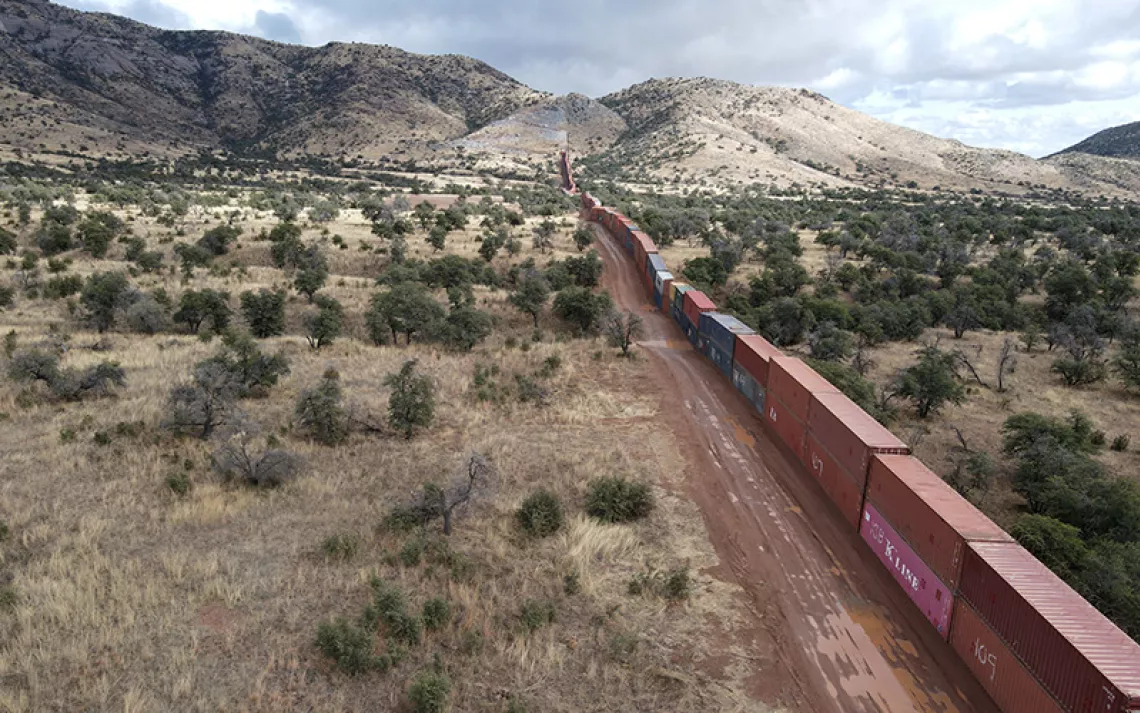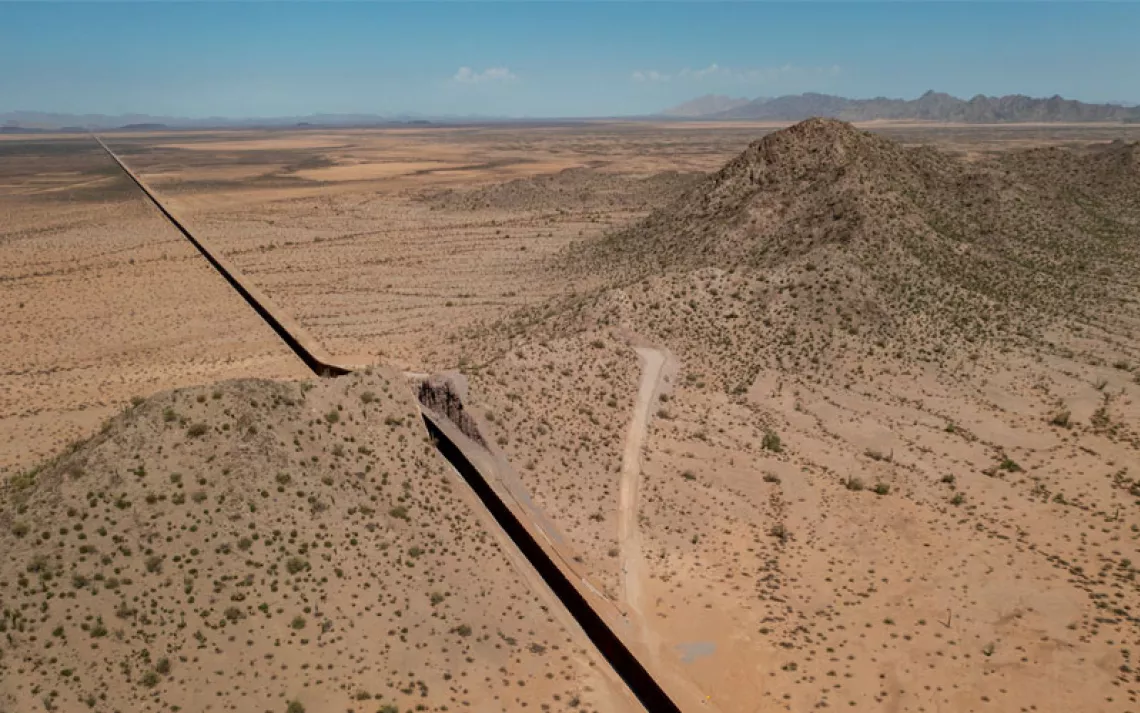Free-Trade Triage
On the border, a Mexican doctor treats NAFTA’s victims

As leaders of the Western Hemisphere met in Quebec last spring to discuss expanding the North American Free Trade Agreement to include almost every scrap of land between the Arctic and Tierra del Fuego, Dr. NancyRodríguez was in a colonia on the Mexican border trying to figure out how to deal with rats. A world away from the high-powered talks in Canada, the young physician found herself at ground zero in the free-trade zone--where aggressive theories of economic expansion find real-life expression.
The squatter-settlement-turned-neighborhood where Rodríguez works is called Derechos Humanos--Spanish for “human rights.” Its 15,000 residents are mostly migrants from Mexico’s interior, drawn to the border in hopes of finding work after NAFTA went into effect in 1994. When Rodríguez opened the colonia’s first health clinic three years ago on the outskirts of Matamoros, Tamaulipas, residents had no running water, electricity, or sanitation. Homes were built of cardboard or plywood, while a fallow piece of land adjacent to the colonia, owned by a Matamoros family named Guerra, served as a makeshift dump. A canal on the colonia’s southern edge was used as storm drain, trash bin, rodent refuge, and illegal dumping ground for the industrial waste produced by nearby maquiladoras, or assembly plants.
When Mexico’s Border Industrialization Program began in 1965, Matamoros--which is just across the Rio Grande from Brownsville, Texas--was a small city with roughly 70,000 inhabitants. Back then, industries from the United States built plants all along the 2,000-mile border, taking advantage of rules that allowed companies to import raw materials duty-free for assembly in Mexico and then export the finished product--also duty-free--back to the United States. Other enticements included low health and safety standards for workers, meager wages, lax environmental oversight, and proximity to the U.S. market. In the ensuing years, companies from other countries built maquiladora plants as well. But the passage of NAFTA, with its accelerated elimination of additional trade barriers, shifted border industrialization--as well as migration--into overdrive.
Though maquiladoras pay some taxes to the central government in Mexico City, they are not required to contribute to the local tax base in any substantive way--which means that border boomtowns like Matamoros have not been able to keep pace with their rapid growth. Matamoros has doubled in size since NAFTA’s passage, to nearly 700,000 residents, overwhelming the city’s infrastructure.
Water is also a problem. Steamers once plied the Rio Grande, but now the river is shallow and polluted. According to the U.S. EPA, Matamoros will have serious water shortages by 2005. It is a city fueled by free trade, but growing all out of proportion to itself.
There is a difference between the earth and the world, and 36-year-old Rodríguez has come to understand it. The world is that blue bauble seen from outer space, an idea rather than a place with people in it, impelled toward the future by grand abstractions: globalization, liberty, free trade. In the world, there are no limits. The earth Rodríguez walks on each day is something else again, animated by squawking chickens on the roadside; old men selling edible yucca blossoms and used clothing from donkey-drawn carts; children running and screeching in a hard-packed dirt schoolyard; corn sprouting from the soil; asthma; typhoid; dengue fever; rats.
Rodríguez was raised and went to medical school in Matamoros, but not until she ventured into the colonias did she see the links between the health of the body and the health of the air, water, and land. “It became impossible for me not to relate health and environmental issues,” she now says. “I had never before been so close to families with basic needs such as water, sanitation, and electricity.” Smoke from the nearby and constantly burning municipal dump blankets Derechos Humanos and, according to Rodríguez, causes eye, skin, intestinal, and respiratory problems. Uncollected trash in and around the colonias attracts rats and flies, which transmit diseases like typhoid. Without running water, families have made do catching rain in barrels or waving down the water man who periodically passes by in his truck. Standing water breeds mosquitoes, which can carry dengue fever.
Along the canal, a boy playing soccer misses his goal attempt and sends the ball sailing. His friend descends the trash-strewn bank, chasing the ball into the fetid water--which contains a belly-up cow. Empty plastic bags are everywhere, thousands of them caught on barbed-wire fences and in the denuded branches of the few remaining mesquite trees. The bags snap in the interminable wind; the loose ones float like ghosts of consumers past above the land. “Families put up with the environmental problems because they are focused on survival,” says Rodríguez. “I just try to improve the quality of their lives a little, and help them help themselves.” In faded blue letters, Rodríguez’s clinic calls itself a dispensary, but since she has few medical supplies to dispense, she spends most of her time educating women about family planning, environmental health, hygiene, and nutrition.
Rodríguez’s favorite saint is Angela Merici, who founded the Saint Ursula Society in 1535. Angela was a radical in her time because she took a path that led neither to the nunnery nor the altar. In an age when cloistered seclusion was promoted for women who did not marry, Angela believed that a life of faith should be lived in the streets, and the women who joined her society walked directly into the social web of their communities. “In order to educate,” wrote Saint Angela, “first of all one has to respond to the more urgent material needs.” Though Rodríguez is married to a lawyer in Matamoros (who calls his wife a dreamer and idealist), much of her work is suspiciously reminiscent of Angela’s. She works with Brownsville’s Ursuline nuns, who pay her “an irregular stipend,” based on donations, to run the Derechos Humanos clinic.
Ursuline sister Maria Teresa de Llano first met Rodríguez when they worked together for Mano a Mano (Hand to Hand), a nonprofit cross-border organization that trains community health workers. “She’s effective because her whole heart and soul is in her work,” says Sister Maria Teresa of her friend and colleague.
When funding ran low in 1997, Rodríguez left Mano a Mano and soon began working with Sister Maria Teresa and others on a health outreach and education program called Organización de Comunidades pro Vida Digna (Communities Organized for Life With Dignity). When asked why she would choose that work rather than private practice, Rodríguez answers simply, “I have food; I have shelter; I have family.” When pressed, she adds, “I don’t consider myself political, but it’s hard not to see that we live in a time when money has become the most important thing. It’s not. For me, what’s important is improving things for others. My way is through service.” She speaks softly, but her impeccably made-up eyes are intense.
“She’s not just a medical doctor,” says Sister Maria Teresa. “She’s willing to do whatever needs to be done to help people.” The day I visit, Rodríguez is planning a community effort to pick up mountains of trash among the rats. When she invites me to help, there really is no option.
I had been to Derechos Humanos the day before with Sierra Club Board members, who were in Brownsville to learn more about the massive environmental problems faced by border communities like Matamoros. As the number of assembly plants rises--along with toxic waste, air pollution, and water contamination--so does the population. But between NAFTA’s passage in 1994 and 1999, wages in the manufacturing sector fell 13 percent--from $2.18 per hour to $1.89. Purchasing power shrank by 39 percent. The promised boon for Mexican maquiladora workers has not materialized, but still they come. Political camps disagree about whether NAFTA accelerated this race to the bottom in terms of wages and inflation. But the trade pact’s role in exacerbating population pressures at the border is unmistakable: When trade barriers to imports of U.S. corn were lifted and Mexican subsidies eliminated, hundreds of thousands of small-scale Mexican farmers could no longer compete. During the 1992 U.S. presidential campaign, independent candidate Ross Perot talked about the “sucking sound” that would be created by U.S. jobs being pulled to Mexico if NAFTA passed. What has proven devastating for the border’s environment and for Mexico’s agricultural sector in general, however, is the sucking sound of thousands of subsistence farmers being pulled northward from Mexico’s interior to the maquiladoras.
Domingo González is a Vida Digna member and longtime environmental activist (see “Border Patrol,” May/June 1994). According to González, those who followed the NAFTA dream north have not seen any improvement in their lives. “The drive for profit is causing a disaster in our communities,” he tells me. “The more factories we get, the poorer we get.”
Sister Maria Teresa has a slightly different take. “People coming to the border don’t want to get rich; they just want to feed their families and live with some kind of dignity.” But she adds that conditions in the colonias are actually improving--because of the resourcefulness and drive of residents. “I know it sounds crazy, but it’s true,” she says. “People are slowly making small improvements in their situation.”
Claudia Zuñiga is Rodríguez’s assistant at the clinic. She came north from a farming village in San Luis Potosí several years ago with her family, “in order to have a better life.” Zuñiga says she is better off in Derechos Humanos. When she and her family first arrived, they squatted on a patch of land and built a shelter of cardboard, with nails ingeniously pounded through bottle caps to keep the flimsy material from pulling apart during storms. In the hands of the poor, recycling is a survival skill and art: Pallets thrown out by maquiladoras become picket fences. Tires cut into flaring petal shapes serve as decorative planters. Discarded bones from slaughtered cattle become buttons and plates. Nothing is wasted, including the waste. There is even a name for those who live at the dumps: Pepenadores, or trash pickers, can get the equivalent of 80 cents for two pounds of salvaged copper, or 8 cents for two pounds of bone.
The Zuñigas are certainly better off than the pepenadores. Claudia’s husband was not able to find work in the maquiladoras, but he finally found a job as a security guard in Matamoros. The Zuñigas’ meager income has allowed them to move up the social ladder, colonia-style: Over the few years since their arrival, first plywood replaced their cardboard home, and then they began paying off the owner--a few pesos at a time--for the land they had squatted on. Now, as Zuñiga and Rodríguez proudly point out, a one-room cinder-block building under construction will someday be the radically improved casa Zuñiga. There is still no electricity; an outhouse will continue to serve its vital purpose. But the Zuñigas are getting water. The residents of Derechos Humanos--most of whom did not finish primary school and who, on average, make less than $4 a day--raised $9,000 ($54 per family) to pay the government to put in water mains and hookups to each and every home.
“The village Claudia comes from is very pretty and peaceful,” says Rodríguez. “But there is no work. Claudia has told me that she greatly misses the customs and traditions of her village, but she also says she can’t return. Her life is here now.” Colonia representatives also negotiated with the government to get trash picked up once a week. It was after this triumph that Rodríguez decided it was time to clean up the Guerra land. The ruin of the place is difficult to describe--just imagine walking onto a football field covered with soiled paper, broken glass, diapers, all other types of junk, and those ubiquitous plastic bags. On the appointed day, Rodríguez arrives in her beat-up blue Toyota wearing her trademark eyeliner, chocolaty-red lipstick, a skullcap pulled low, and a huge windbreaker to protect against the chill wind.
As we wait in the clinic for others, I ask where the men are. The women sitting together on the bench--Juanita Hernandez, Laura Flores, and Delfina Zuñiga--look at each other and laugh. So does Rodríguez. “We had a cleanup last week, too,” Rodríguez says, smiling. “There were eight women, fifteen kids, and no men. When we built this clinic it was almost all women helping!” Rodríguez thinks for a minute and adds, “The women have more interest in bettering the community, and since they are essentially head of the household, they see what needs to be done and they do it.”
Rodríguez notices two of the women aren’t dressed for trash detail. Hernandez and Flores are both wearing flimsy sandals, most likely the only shoes they own. Rodríguez disappears into a small room, which acts as a repository for church donations from Brownsville. While she’s gone, the women talk about life in the colonia. “That canal,” says Delfina Zuñiga shaking her head, “When the wind comes in from that direction it’s horrible. You can’t eat it’s so bad.” Flores adds, “In March and April the dust starts coming in. It’s contaminated and the kids get rashes.”
The doctor returns a few minutes later with two pairs of second-hand shoes--one set of scuffed pumps and a pair of tasseled loafers. They aren’t a bribe or reward really, but others are sure to hear about the benefits of being a part of Rodríguez’s beautification projects.
All told that day, there are eight women, five children, and a profane amount of garbage. I watch the kids make a game of picking it up. The women use their proximity to each other to gossip. Rodríguez works alone, though she’s periodically interrupted by one of the little boys in the group who appears to have a crush on her. I work, but feel about as useful as a dust mote. Do these people actually think they can clean this fouled land by themselves? In frustration, I begin to play my own game: As I stuff smashed plastic Pepsi bottles and jagged cans into my heavy-duty bag, I mentally trace the garbage to its source--not to the people who had no other place to put it but to the forces that drew so many desperate migrants to the border in the first place. Of course there is the loss of livelihoods in the villages and the promise of factory work. But it also occurs to me that, as in the drug war, part of the problem is demand--that incessant and insatiable desire for cheap and plentiful products like the ones being put together at the AT&T, Fisher-Price, General Motors, and Zenith plants just down the road.
Certainly the Free Trade Area of the Americas--the one hyped by President George W. Bush in Quebec--needs to contain strong worker and environmental protections. In fact, a recent report by the EPA’s Border Program warned that, given current trends, the border will see “growth, but not prosperity or stability.” The report also noted that the NAFTA-created mechanism for responding to environmental problems in the region “has neither a dedicated EPA staff nor a dedicated budget.” The FTAA does nothing to address this disturbing oversight.
But perhaps something else is required as well--something like a new notion of nonviolence, one that advocates resource conservation and consumer self-control as a way to preserve resources and human rights. In effect, Rodríguez and her rubber-gloved crew are cleaning up after people like me: Though we may look at the price tag before we buy another thing we don’t need, we don’t truly see the cost. Both the thought and my surroundings rattle me. I stoop down, come up with a handful of dirt-caked plastic diapers, and stuff them in my bag.
The low-tech cleanup of the Guerra land continues, with Rodríguez cajoling residents to take control of their community. But some comparatively high-tech and high-turnout help has come to Derechos Humanos as well. A week after the free-trade meeting in Quebec, 500 people came out to clean up the canal. Vida Digna organizers, as well as Rodríguez (who has since left the group), finally got the city government to provide backhoes and garbage trucks for the effort. According to Domingo González, close to 50 tons of trash were collected. The maquiladoras donated $400 to the canal cleanup, and some plastic bags. González says that the problems in colonias like Derechos Humanos are a microcosm of the entire border. “We’ve got to face the fact that after thirty-five years of unchecked maquiladora development, the cost of the cleanup is going to be tremendous,” he argues. “Somebody’s going to have to pay for it. The poor can’t continue to pay. Nor should they have to.”
In May, the Sierra Club, in cooperation with The Sierra Club Foundation, created Beyond the Borders--a three-year, $1 million grant program aimed at countering the ill effects of free trade. Beyond the Borders will support grassroots environmental organizations in Mexico like Vida Digna that are fighting air and water pollution from maquiladoras. But in terms of government action, not much is happening.
“People deserve to live with dignity,” says Rodríguez. She is walking me through the skeleton of the future clinic, which is being built cinder block by cinder block beside the old one. There is no roof, no interior walls, no doors. Colonia residents are building it themselves, but the donated materials trickle in sporadically. Rodríguez points to a barren slab of concrete: “There will be room for two beds here,” she assures me, “and a waiting room over there. We’ll have a computer and a pharmacy. There will be medicine, and a place for daycare, too.” The wind has come up again, bringing with it the acrid and stinging smoke from the burning dump. “Little by little,” she says to no one in particular. “These are the dreams.”
 The Magazine of The Sierra Club
The Magazine of The Sierra Club



